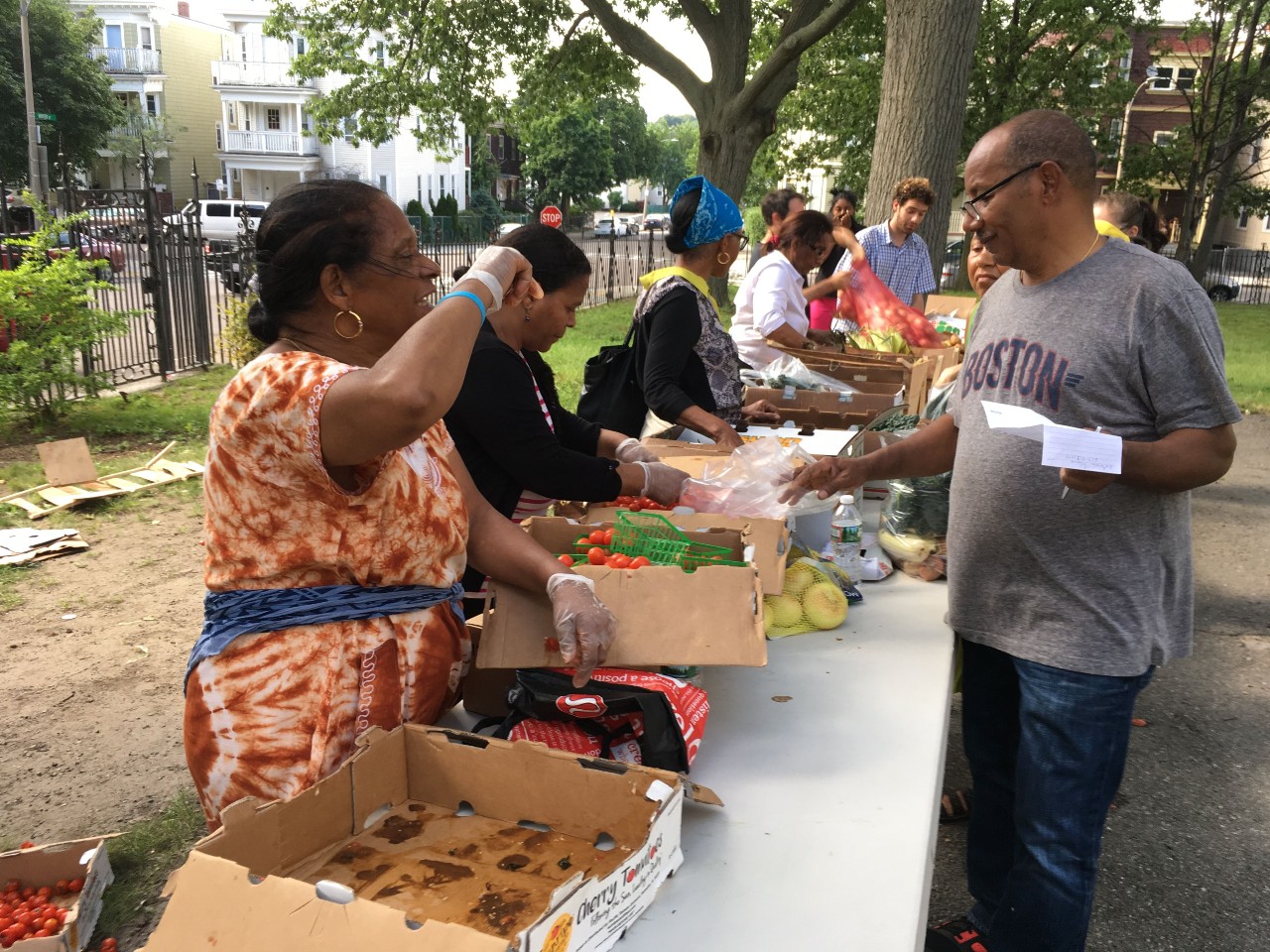

First Parish Dorchester food distribution in Massachusetts. Credit: firstparishdorchester.org/
Boston
Amid ongoing austerity, workers and other marginalized communities in the U.S. are suffering from a crisis of chronic food insecurity. When the COVID-19 Public Health Emergency (PHE) expired May 11, tens of millions of people lost access to basic nutrition provided by the expanded Federal Supplemental Nutrition Assistance Program (SNAP). These cuts, in addition to inflation stoked by corporate price- and rent-gouging, have forced millions of families to go hungry.
In Massachusetts alone, a recent survey found that 1.8 million, one-third of the state’s adult residents, struggle with food insecurity, a 13% increase from 2020. The statewide hunger crisis disproportionately affects communities of color, as well as adults who identify as LGBTQIA+. Some 36% of Massachusetts households have reported that their children experience chronic hunger. (tinyurl.com/2xc28bu7)
Many residents report having to choose between a meal and other basic necessities. “When you get to be my age, you worry over questions like: ‘are you going to have enough food to eat for the month?’ ‘Do you have to buy groceries instead of paying for your medicine?’ I have to make that choice most of the time,” said one of the survey’s respondents. (Boston.com, May 30)
Endemic food insecurity in Massachusetts reflects a nationwide trend. According to an Urban Institute survey, over 25% of adults in the U.S. suffer from regular hunger. (tinyurl.com/2vkdrect)
Workers’ wages cannot keep pace with capitalist extortion, which continues to jack up the price of groceries. Black and Latiné adults remain at heightened risk of food insecurity nationally. (urban.org, March 21)
First Parish Dorchester food distribution in Massachusetts. Credit: firstparishdorchester.org/
The crisis is overwhelming food pantries across the country. As Laurie Prizel, the Executive Director of Dimitri House, a food bank in Rochester, New York, said in a recent local news interview, “I can tell you on a weekly basis, half of what we have coming in here to our food cupboard are brand new people every week. There’s more people coming in that just can’t make ends meet anymore.” (13wham.com, June 1)
Democratic, Republican Parties – pro-big business
Yet despite this hunger epidemic, bourgeois politicians are imposing new austerity measures, which promise to make the epidemic even worse. Already the Biden administration has slashed much of their $1.7 trillion in PHE spending. But even these devastating cuts do not suffice for the ruling class.
President Joe Biden and Republican Speaker of the House Kevin McCarthy agreed on May 27 to raise the ceiling on the national deficit. Along with a freeze on future social spending, further cuts to remaining COVID-19 relief and a mandate that federal student loan recipients resume debt payments in August, the deal includes a mandated work requirement for Temporary Assistance to Needy Families programs. These new requirements will force adult recipients under the age of 54 to submit to increased exploitation in low-wage jobs for at least 80 hours a month in order to qualify for benefits.
That a majority of Democrats are championing these cuts should come as no surprise. In 1996, President Bill Clinton signed the “Personal Responsibility and Work Opportunity Reconciliation Act,” which first imposed the neoliberal workhouse programs Biden and McCarthy are both planning to beef up.
Although the Pentagon budget stands at a record high of $842 billion, both Democratic and Republican lawmakers have agreed to accept it, taken from budget cuts. The tens of billions recently spent bailing out failing banks such as SVB and First Republic also went unmentioned during the Congressional debate on “fiscal responsibility.”
Despite opposition from arch reactionary Republicans, who were clamoring for even more draconian austerity measures, Congress passed the deficit ceiling deal, and Biden signed it into law June 3.
The magnitude of this new round of bipartisan austerity demonstrates the need for full support and solidarity with the worldwide struggle of workers and oppressed communities, who are mobilizing to fight for a socialist society, where housing, health care and food are not commodities but human rights.
This statement was recently issued by over 30 groups. On Friday, March 28, Dr. Helyeh…
By Jeri Hilderley I long for peace and ease as stress and anxiety overtake me.…
Los siguientes son extractos de la declaración del Gobierno de Nicaragua del 9 de abril…
The following are excerpts from the statement of the Nicaraguan government on April 9, 2025,…
The following is a statement from the organization Solidarity with Iran (SI) regarding the current…
By Olmedo Beluche Beluche is a Panamanian Marxist, author and political leader. This article was…